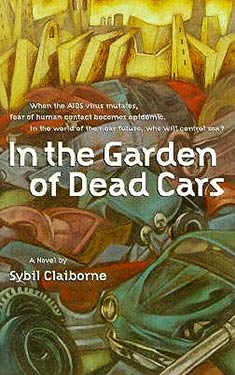Sybil Claiborne
Completed 3/4/2016, reviewed 3/4/2016
4 stars
“In the Garden of Dead Cars” is a post-apocalyptic novel about
humanity after a plague that actually worried me back in the ‘80s, that the
AIDS virus would mutate and go airborne.
I imagined the world coming to an end a la Stephen King’s “The
Stand”. Claiborne imagines something
less cinematic but just as dramatic, as the world’s population is cut in half
and a fascist government outlaws sexual contact.
 The plot centers on Emma, a young woman in future New York
City whose dream is to rebuild a Subaru from the parts of dead cars in the
giant dead car lot of Central Park. She
is a product of her times, eschewing contact, and refusing to even reproduce in
the sterile, artificial insemination clinic, though it is required of all
women. She lives and argues with her
mother who reminisces fondly and fiercely of the time before the plague. Much of the book’s conflict comes from the
two of them arguing about living in the past and how to live in the present.
The plot centers on Emma, a young woman in future New York
City whose dream is to rebuild a Subaru from the parts of dead cars in the
giant dead car lot of Central Park. She
is a product of her times, eschewing contact, and refusing to even reproduce in
the sterile, artificial insemination clinic, though it is required of all
women. She lives and argues with her
mother who reminisces fondly and fiercely of the time before the plague. Much of the book’s conflict comes from the
two of them arguing about living in the past and how to live in the present.
Society is kept in place by the evil comedians, formerly,
the police. It was decided that society
needed to laugh after the plague, and bullets were becoming rare. So they trained the police to add humor to
people’s lives. At first it worked, but
it quickly devolved into a sadistic vigilante group, using fear to keep people
from human contact or other subversive thoughts. Besides the comedians, the government uses
terror to keep society down by regularly televising executions of sexual
outlaws.
There are two types of sexual outlaws. There are the regular citizens who become
outlaws when they have sexual contact and procreate. They are pursued by the comedians and
sometimes executed. However, there’s a
second group, the “carnals”. They are
people who remained coupled even when being in a relationship was
outlawed. They are the new lower
class. The government labels them a
dirty subspecies to help whip up public sentiment against them. But these carnals are effectively invisible,
dropping out of society to live in squalor so that they can have what we
consider “normal sexuality”.
The book is beautifully written. There is an ease and gentleness to the prose
despite the horrible environment it describes.
Emma herself is a hard person, as described by her mother and her
co-worker. She’s a product of the new
society and rebels against her mother’s reminiscing of the past. However, her reality is chipped away slowly
as she becomes more aware of the oppression and subversion around her, even
finally realizing that her mother is not just living in the past, but radically
trying to change the present.
I give this book four out of five stars. Reading it was a delight, which was very
welcome after just finishing a book that was terribly written. Claiborne took some interesting worst case
scenarios and weaved it into a very readable book. The plot is fairly straight forward. Halfway through the book, you know what’s
coming. But that’s not quite as
important as Emma’s journey through this fascist world extrapolated from the
concept that sex is bad.
No comments:
Post a Comment